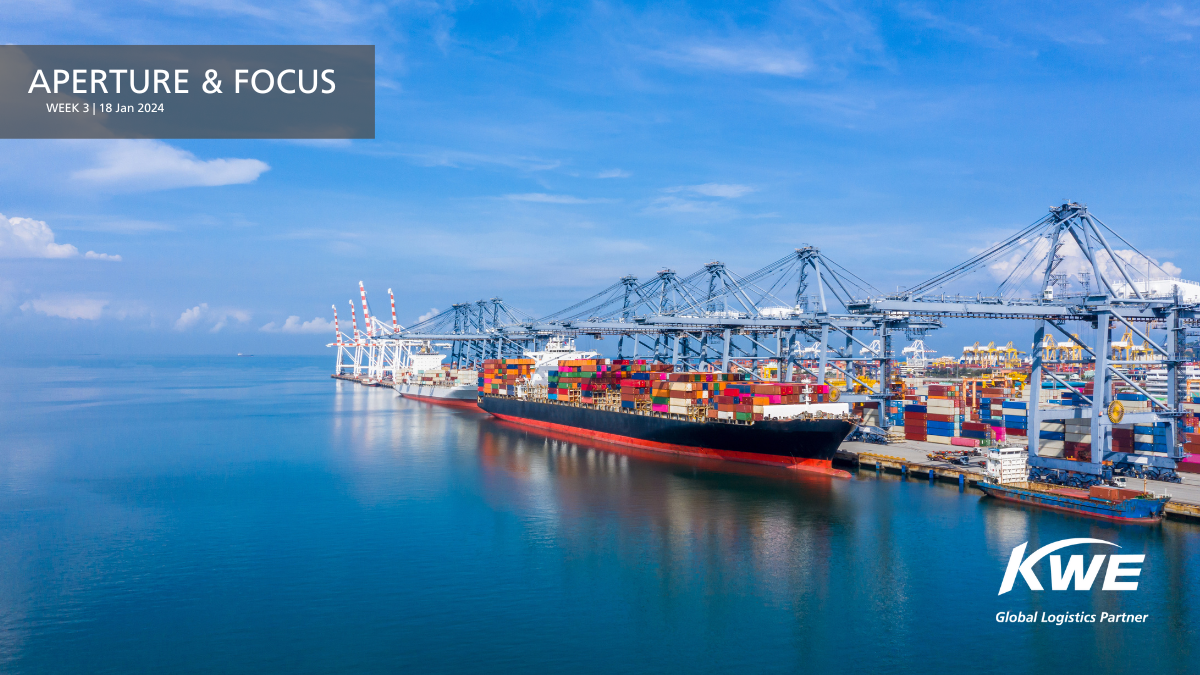Quote
Aperture & Focus 2024: Week 3

Global Aperture
War risk insurance premiums for shipments through the Red Sea are on the rise due to recent attacks by Yemen's Houthi rebels, targeting merchant vessels. The heightened risks have led to potential hundreds of thousands of dollars in additional costs for shippers as many continue to opt for the longer journey around the southern tip of Africa.
On January 11th, A.P. Moller-Maersk announced the decision to use the Panama Canal Railway, a 47-mile railroad that runs adjacent to the Panama Canal, to bypass the ongoing limitations on the number of vessels allowed to pass the waterway each day. Delays are expected for southbound routes and the service will now omit the Port of Cartagena, Columbia’s main export port.
Regional Focus
Americas
United States: In a letter on January 9th, The National Retail Federation (NRF) raised concerns over a potential strike at US East Coast terminals in October. With the labor contract between the United States Maritime Alliance (USMX) and the International Longshoremen’s Association (ILA) set to expire on September 30, the NRF is urging both parties to recommence contract negotiations, emphasizing substantial obstacles concerning worker pay, employment models, work allocation, and automation.
On the US West Coast, ports are preparing for a surge in imports driven by supply chain and geopolitical challenges, including the resumption of inventory build-up, returning flows from other gateways, and concerns about potential disruptions at east coast ports. While there are concerns about managing increased volumes, port infrastructure improvements and preparations are expected to help mitigate congestion risks. However, trucking capacity and challenges related to chassis ownership documentation pose additional considerations.
Asia-Pacific
Japan: The 7.6 magnitude earthquake that struck Japan on January 1st is having on-going adverse effects on semiconductor supply chains, causing potential shortages in electronic components and a global price surge. According to experts, the damage to infrastructure and production halts in the affected area will likely tighten the global supply-demand gap for electronic components and may also trigger increased demand for construction materials, causing strains on raw material availability and labor shortages.
Malaysia: Amid the ongoing Red Sea crisis, the Federation of Malaysian Manufacturers (FMM) has advised its members to source raw materials from neighboring countries and book containers in advance to navigate the supply chain challenges. With an estimated 80% of ships having been re-routed around Africa from their normal Suez Canal route, the FMM recommends using a mix of sea, air, and land transportation in anticipation of fluctuating freight rates and extended sailing times. They have also suggested collaboration with ASEAN counterparts to build resilience in the face of shipping disruptions and potential threats to global supply chains.
Australia: As ongoing disputes between DP World and the Maritime Union of Australia at the country’s primary container ports continue to lead to mounting disruptions and backlogs, Australia’s Employment and Workplace Relations Minister has asked to meet with both sides in hopes of breaking the deadlock. With strikes, work stoppages, and delays affecting about 40% of Australia's container volume, concerns are growing among business leaders about the economic toll, estimating losses exceeding $50 million weekly and raising fears of supply chain delays contributing to inflationary pressures. The latest strike action is not set to subside until January 24th.
Europe, Middle East & Africa
North European container ports are anticipating a potential capacity crunch in early February as vessels are rerouted around Africa from Asia are set to arrive. While experts suggest that congestion is not expected to reach the levels seen after the Suez Canal blockage in 2021, the delays will likely lead carriers to switch port rotations or consolidate operations.